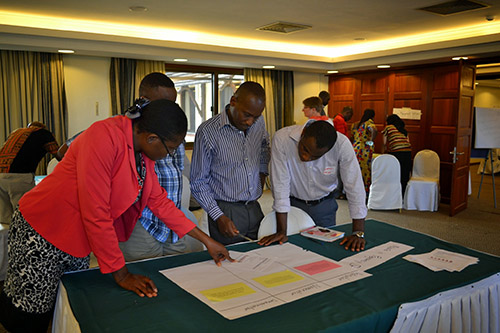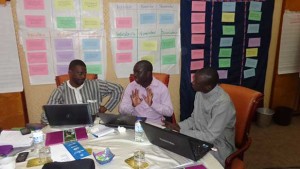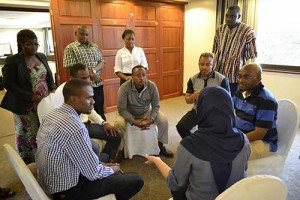Beyond Data Analysis: Collaboration and Capacity Strengthening
Have you ever been to a workshop that combined interactive PowerPoints, fun hands-on activities, malaria indicator trivia games, and lots and lots of data analysis? No? Well then, you haven’t taken part in a Regional DHS/MIS Malaria Analysis Workshop hosted by The DHS Program. The malaria analysis team recently hosted two such regional workshops, one in Tanzania and the other in Senegal, with more than 30 participants representing 13 African countries.
Participants worked in country teams of 2-3 people to answer a pre-identified malaria-related research question through analysis of DHS/MIS data in Stata. While some people might cringe at the thought of an eight day data analysis workshop, in true DHS fashion there was nothing boring about this workshop. Activities throughout the workshops were designed to encompass a range of adult learning techniques – interactive PowerPoints, guided demonstrations, hands-on exercises, and small group activities were all used. The workshops culminated with each team presenting a conceptual framework, key variables, analytic methods, and preliminary results.
Chinazo Ujuju from Society for Family Health in Abuja, Nigeria reflects, “As a researcher I have the drive to analyze available data to provide relevant information for evidence-based public health interventions in my country, Nigeria. Attending the DHS/MIS data analysis workshop has equipped me with the skills to better analyze DHS and MIS datasets using Stata software. I am now competent in multivariate analysis of these datasets. I hope to use my skills to provide information for malaria programming with the ultimate goal of ensuring that relevant information are available to inform policy decisions that would improve global health. “
Fankeba Souradji of Togo comments, “Je profite pour dire merci aux facilitateurs pour la qualité de la formation. Nous vous en sommes très reconnaissants.”
Though the workshop focused on strengthening data analysis skills, participants also enjoyed the opportunity to collaborate and learn from colleagues from other countries.
Nabila Hemed from the National Malaria Control Program (NMCP) in Tanzania says, “The Regional DHS/MIS analysis workshop has been a wonderful seminar that has brought together professionals of various degrees of experience. The first time I worked with DHS was two years ago. After attending this workshop I learned different issues, limits, and challenges that should be considered during analysis of DHS data. The best part was hearing various country contexts and the effects in data analysis. This helped me understand the impact of research and program decisions during analysis of DHS data. I joined this workshop under the notion that I would simply learn how to analyze to DHS data and how to use Stata. However, I got so much more than what I expected! I received a handful of knowledge and resources that I will definitely use and share with my colleagues at work.”
Though both workshops are complete, country teams are continuing work on their research proposals and abstracts. The DHS Program looks forward to seeing the final products from the workshops in upcoming scientific journals and conferences.




